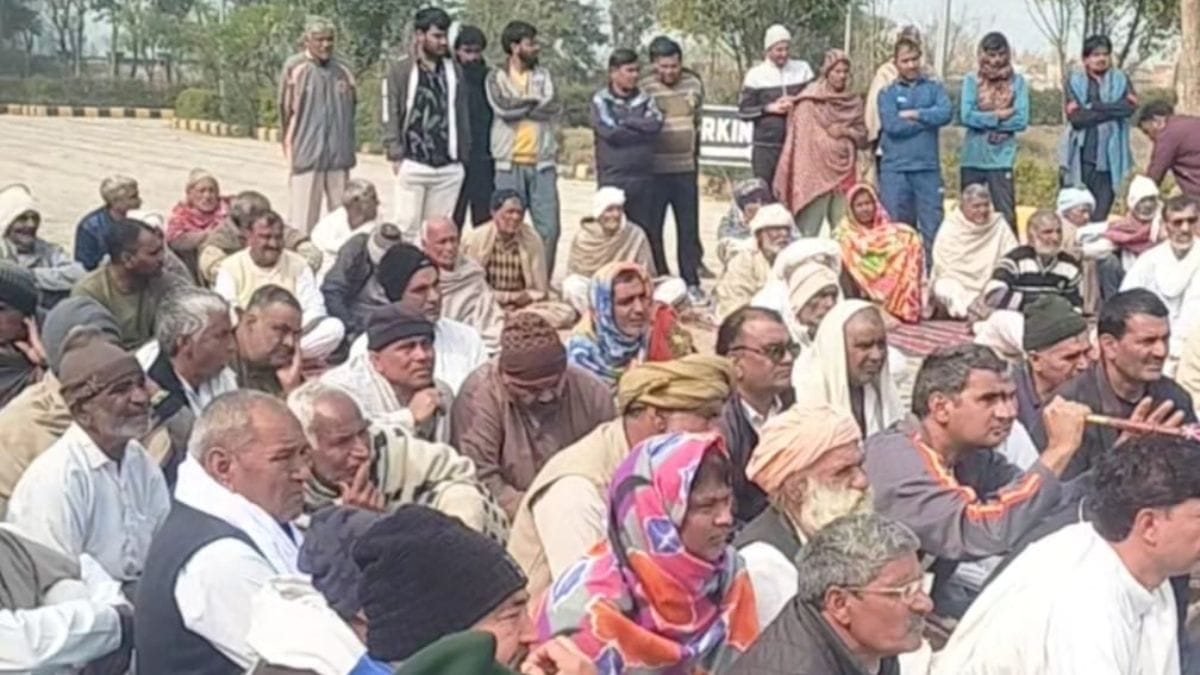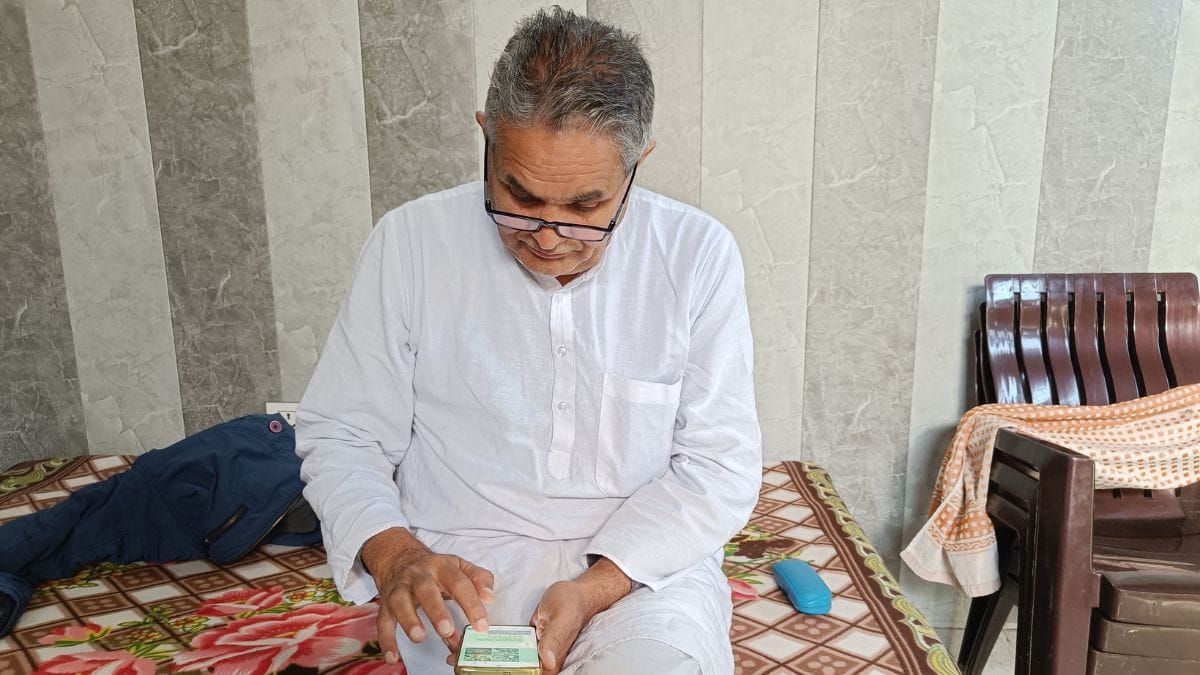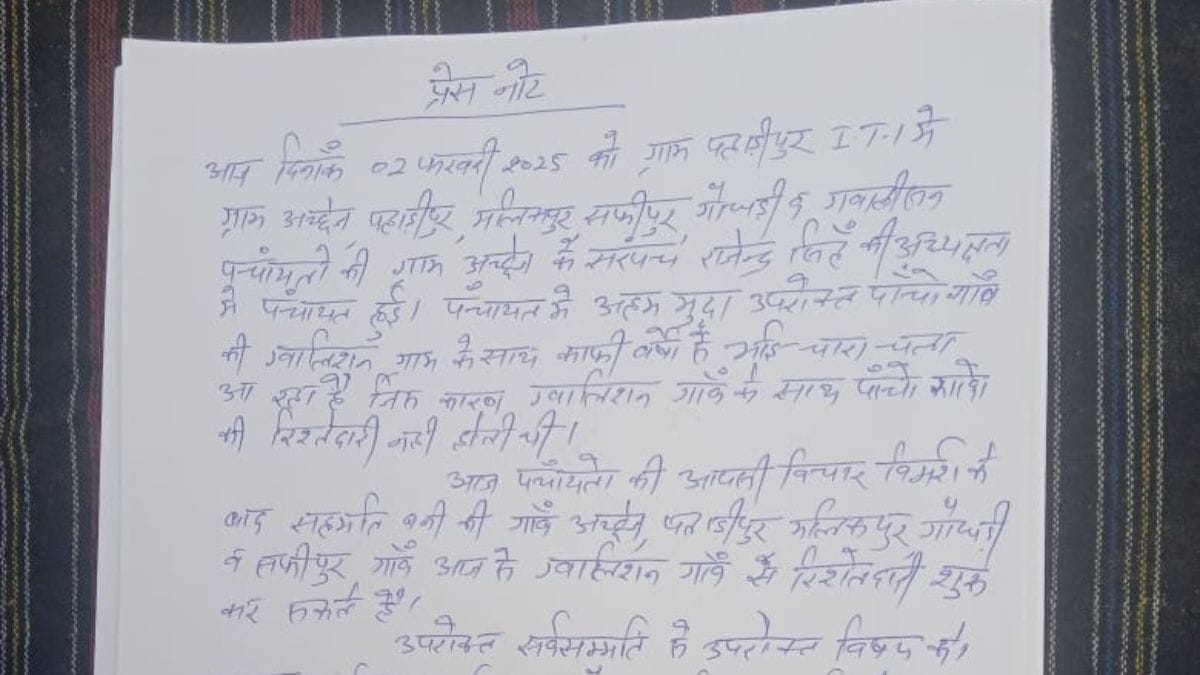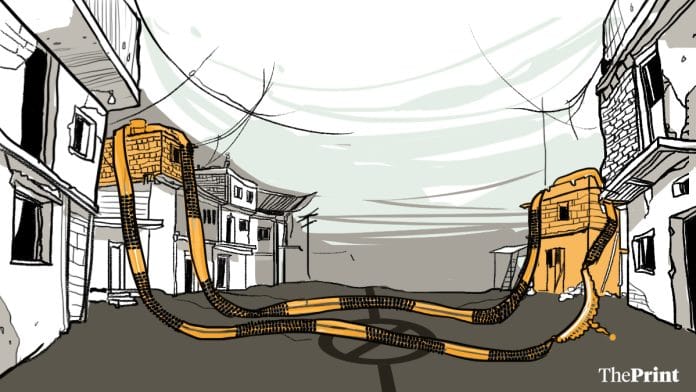Jhajjar: A centuries-old taboo has just been broken by a Haryana khap. Young men and women can now marry from neighbouring villages. Just a decade ago, it was considered a crime that was punished with so-called honour killing.
This is nothing short of a social revolution in Haryana. Now the elders in six villages of Jhajjar and Beri subdivision are holding their breath for the first wedding to happen to enact the revolution.
A white piece of paper is witness to the change that will overturn this decades old practice. Rajinder Singh Solanki, under whose chairmanship the villages reached the consensus, said “the consent of the sarpanches were not just signatures but the beginning of a new chapter. A chapter that we are writing for our future generations.”
It wasn’t easy to undo a deeply held local oral history masquerading as tradition and science. A story about a young woman from Godhadi village had been swirling for over a hundred years and became the touchstone of village honour here.
Recalling the stories he had heard from his ancestors, Manbir Beniwal, sarpanch of Godhadi village, said that 100 years ago, when a woman from one of our five villages was going towards Jhajjar, someone tried to molest her. At that time, the people of Gwalison village saved her.
The gratitude Godhadi experienced crystallised into a social norm. Since then, Gwalison and Godhadi villagers became brothers and sisters. And it was forbidden to marry each other. Across Haryana, young couples have to live by such socially constructed dos and don’ts and defiance would earn the wrath of Khap panchayats.
Now, it is increasingly unsustainable.
“The people of Gwalison village saved the honour of our village. We are grateful for this till date but now it is time to move on,” said Manbir.

Also read: Indian shaadi checklist gets longer. Lehenga, mehendi & now pre-marriage counselling
The khap that changed it all
The weight of history hung heavy over the historic panchayat gathering earlier this month. Villagers knew they were on the cusp of change.
More than 150 residents of six villages—Malikpur, Paharipur, Godhadi, Safipur, Aachhej and Gwalison located just few kms from Sahibi river—turned up in their Sunday glory, draped in long flowing shawls and traditional white attire and turbans.
The site was the ITI grounds in Paharipur village, a hub for youth looking for technical training for jobs. That day, it was abuzz with hushed conversations in the Haryanvi dialect and gurgling hookah sounds.
The matter of inter-village marriages was debated for four hours.
“Finally, after intense deliberation, we have reached a consensus to change bhaichara (brotherhood) to rishtedari (marital relation) as our gotras (sub-castes) are different,” said Rajinder Singh Solanki, sarpanch of Aachej village who presided over the panchayat. Marriages between different sub-castes is an acceptable social norm.
But this decision in Haryana was paved with blood. The local khaps have often turned into kangaroo courts and decided the fate of young couples who violated these social rules. Such killings stirred the conscience of north India in the 2000s and the debate was projected as a tradition-vs-romance binary. It was all clubbed under the umbrella term of honour of a village. And young couples were forbidden from falling in love within a village, with neighbouring villages and within a clan or gotra. After the 2007 case of Manoj and Babli, then Home Minister P Chidambaram amended the IPC and declared the so-called honor killing a distinct offense.
“In modern times, khaps are under pressure to change their thought. With the arrival of new leadership within the khaps, examples of moving forward by abandoning old social values are emerging,” said Vijender Singh, sociologist and professor at Kurukshetra University. “The Khaps are changing themselves to maintain their existence and relevance.”
Finally, after intense deliberation, we have reached a consensus to change bhaichara (brotherhood) to rishtedari (marital relation) as our gotras (sub-castes) are different.
Rajinder Singh Solanki, sarpanch of Aachej village
Also read: ‘Educated Dalits’—how these two words swung Bombay HC landmark verdict for 2 JNU scholars
The gotra ties
It has just been a couple of weeks and the process of transforming brotherhood into kinship has begun already. Manbir is planning to meet Yudhveer Singh, Pradhan of Dhankhar Khap and resident of Gwalison village, to get the first marriage of the new era going.
“The first example should be set soon. Nothing will happen just by holding a Panchayat and taking a decision. The result of the Panchayat will be visible only after the first marriage,” said 42-year-old Manbir, smoking his hookah.
Manbir said in his life span, he has never seen any everyday affinity and relationship between these villages.
“There was brotherhood, but only in name. No one participated in anyone’s happiness and sorrow. So, it was right to break this relationship and open a new chapter,” he said, adding that nowadays, children from many villages study together in schools and colleges. “If the children started liking each other and formed relationships, it would bring disrepute. So, we allowed room for possible relationships with Gwalison.”
All the villagers here are jats but their gotras are different. The residents of Gwalison belong to the Dhankhar gotra and rest five villages have different subcastes. While Malikpur, Safipur and Godhadi have families of Beniwal and Phogat gotra, Aachhej residents have Solanki gotra and Paharipur have Siwach gotra.
“In Haryana, there is village and gotra exogamy for marriage and caste endogamy. But in the Hindu Marriage Act, regional disparity was ignored. The youth who were falling in love were following the letter of the law, which created a dispute in the society because in these regions, people consider it as a matter of honour,” said Vijender Singh.
Singh said due to this, many men and women were killed, families were destroyed. But in the last few years, the Khap has changed itself to some extent.
In modern times, khaps are under pressure to change their thought. With the arrival of new leadership within the khaps, examples of moving forward by abandoning old social values are emerging.
Vijender Singh, sociologist and professor at Kurukshetra University
Former Haryana home minister Anil Vij said in February 2024, that between 2019 and 2023, 24 so-called honour killings were recorded in Haryana. According to the NCRB data, between 2014 and 2021, 559 such cases were reported from across the country.
Singh said, earlier marriages were not allowed in the gotra of grandmother, maternal grandmother and father. Now, this social practice is changing.
Professor Vijender Singh lists some reasons behind the change. With increase in urbanisation, impervious rural values and customs are weakening. There is a rapid change in demography as well. The number of migrants is increasing within Haryana as the youth of the state are going out for jobs, bringing in new lifestyles.
Singh said, Haryana has more multi-gotra villages compared to western Uttar Pradesh and Rajasthan. “If all gotras are abandoned for the sake of brotherhood, then marriages will not take place,” he said.
Also read: Tamil Nadu is waging a new North-South clash of civilisations— Sivagalai to Keezhadi
Consensus before the khap
One man set in motion this historic change in Jhajjar khap. It took a whole year for Khap leader Yudhveer Singh Dhankhar from Gwalison village to float the idea, convince elders and build a social consensus. The hallowed halls of tradition were beginning to crack.
A year ago, the residents of Gwalison approached him to intervene. This was the first time people had come to Dhankar Khap head. There had been no previous attempts to end the brotherhood. And the villagers were insisting.
“This was a very complicated task because the relations were stuck for a long time but I had a feeling that this work should be done,” said Singh, sitting at his office in Jhajjar. He got to the job without losing time, calling sarpanches of all five villages to hold a meeting.
They easily agreed to his proposal. “I had not even thought that the work which seemed difficult to me would be done so easily,” said Singh.
The cluster of predominantly Jat villages of about 12,000 people have had a marriage crisis on their hands. Parents had to marry their daughters into families that were several kilometres away.

“Despite being a village of Jats nearby, marriages were not an option for us. There is no logical reason to ban marriages in this modern age, especially when the gotras of these villages are different. So we sat together and resolved the issue,” said Yudhvir Dhankhar, a resident of Gwalison village and pradhan of Dhankhar-12 Khap (head of 12 villages), who started working on building consensus between the villages over a year ago.
Dhankhar, who is in his mid-fifties, sat in his office near Jhajjar’s civil hospital. It is always full of people often smoking hookah and discussing social issues. A farmer by profession, Dhankhar has only studied till high school. It’s his take on social issues that make him popular in the area.
Dhankhar enjoys a formidable image of being progressive and is unafraid to take on challenges. He demanded the removal of then Haryana sports minister Sandeep Singh after the hockey player-turned-politician faced allegations of sexual assault.
Dhankar was in constant touch with five villages and now the ball was in the hands of five villages, each led by its sarpanch.
Achhej village Sarpanch Rajinder Solanki said that it was necessary to build consensus in the entire village before establishing a marriage relation with Gwalison. It was a lengthy process.
The matter was highlighted during morning and evening choupals to make people aware. “We wanted to take this decision by consensus so that no one raises questions later,” said Solanki, adding that all the sarpanches adopted this path. Since these villages are big, it took almost a year to reach out to everyone.
Then arrived the date of mahapanchayat where the decision was formally adopted. It’s not every day that people from six villages gather to decide a matter. Solanki said the last time a similar gathering took place was in 2007 and saw participation from nine villages. The issue was introducing a ban on DJs.
Solanki said everyone was excited and people gathered at the panchayat on time. “This was one of the important moments of my life and I was also presiding over this panchayat.”
There was no opposition to the resolution and it became a unanimous decision.
“There will be no hindrance in any future relationship,” read the adopted note.
It is the job of the ancestors to make a good path for the coming generations. After our decision, many marriages have taken place between the two villages.
Jai Singh Ahlawat, a resident of Dighal village and head of Ahlawat Khap
The inspiration for Gwalison and five villages came from Dighal and Ismaila villages, also located in Jhajjar. There was no relationship between these two villages for about 200 years. This was resolved by the people of both the villages in 2023.
“It is the job of the ancestors to make a good path for the coming generations. After our decision, many marriages have taken place between the two villages,” said Jai Singh Ahlawat, a resident of Dighal village and head of Ahlawat Khap.
Dighal and Ismaila’s case proved to be a milestone for Gwalison and the five villages.
“From here we also felt that we can do the same. It is the need of the hour,” said Dhankhar.
The decision taken by the elders of six villages will impact women. But they didn’t have much say in it. They have just been updated by their husbands about the development.
“Women had no role in that panchayat. But we are very happy with this decision and this should have been done long ago. Everyone wants their children to get married nearby,” said Balkesh, a woman sarpanch of Malikpur village. Her husband and father-in-law were in the panchayat instead of her.
Also read: Real story of Naga sadhus. Kumbh’s rockstars watch T20, OTT, reels, don’t live in caves
Killing for so-called honour
What might seem as a baby step towards social reform is a giant leap, especially in the minds of the people whose lives are going to be impacted. Generations before them did not have this opportunity.
“If such decisions of social change are not taken, then the coming generations will not look at us with respect,” said Manbir, adding that the world is changing rapidly and “we too will have to adapt accordingly and break the old traditions to make the life of our children easier.”
Jhajjar is a rare example in Haryana where many young people are killed in the name of honour. In 2024 alone, three cases of so-called honor killing were reported from Jind, Sirsa and Hisar.
Women had no role in that panchayat. But we are very happy with this decision and this should have been done long ago. Everyone wants their children to get married nearby.
Balkesh, a woman sarpanch of Malikpur village
A father killed his 27-year-old daughter Sarvjeet Kaur in Sirsa. Kaur was in a relationship with a man from a neighbouring village. Both were from Kamboj caste but the woman’s family wasn’t agreeing.
Kaur’s family cited heart attack as the reason for her death before neighbours and relatives. But the truth came out in police interrogation.
In another such incident last year, Hisar resident Tejbir (24) and his wife Meena (22) were gunned down by two unknown persons. Both got married at an Arya Samaj Mandir in Ghaziabad in April 2024.
Tejbir and Meena were distant relatives and belonged to the Jat community and the girl’s family was upset with the marriage. According to police, Meena’s brother called her sister and Tejbir to a park in Hansi and shot them dead.
A year has passed since the incident but the families of the victims justify their decision.
“There is brotherhood among people of the same village and neighbouring villages and people living there are brothers and sisters. In such a situation, marriage should not take place. This is against tradition. If a decision is being taken to break such bonds, then it will definitely be opposed,” said a family member of one of the victims of the so-called honour killing case on the condition of anonymity.
The Kaithal-Sonipat-Jind-Jhajjar belt of Haryana has a bloody history of such violence. When people indulge in inter-caste or inter-religious marriages, they are brutalised by their own families.
“In many parts of Haryana, people associate it with their disrepute in the society and in such a situation they do wrong to their own children,” said Sociologist Vijender Singh.

Also read: NCPCR has been on an anti-madrasa campaign—to rescue Hindu children
Change was overdue
For long, it was a tussle between memory and mobility. There was a stubborn unwillingness to acknowledge change in society. The lores lingered in the air, passed on generation to generation and informed their modern-day choices.
Villagers recall that in earlier times, whenever people from these five villages went to Jhajjar for any work, they travelled through bumpy roads on bullock carts. When they grew tired, they rested en route. Gwalison villagers welcomed them and offered tea, water and hookah which developed brotherhood.
That care and brotherhood congealed in people’s memories.
“Gwalison served as a rest stop for residents of Malikpur, Paharipur, Godhadi, Aachhej and Safipur. The regular visits to the Gwalison developed strong bonds,” Manbir said. However, things have changed now. It has become easier to travel to Jhajjar and people started having their own vehicles, Gwalison village is no longer a stopover.
The old ban on marriages didn’t make sense anymore in the 21st century. Change was overdue.
But this is still not a Haryana-wide change.
Police officials who have investigated cases of so-called honour killing, said that there hasn’t been a major change in people’s thinking.
“Jhajjar’s case is an exception. This kind of revolution is limited and happening in silos and should have a widespread impact. But this does not seem to be happening on the ground,” said a police officer investigating a case of so-called honor killing in Haryana.
(Edited by Anurag Chaubey)







Khaap medal ??